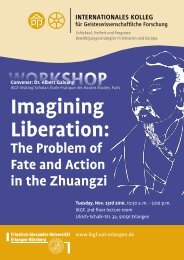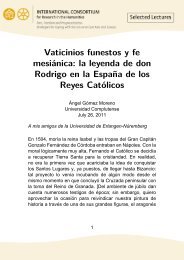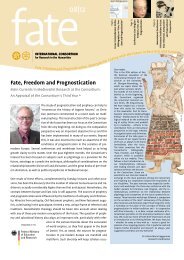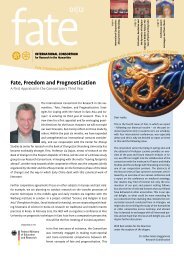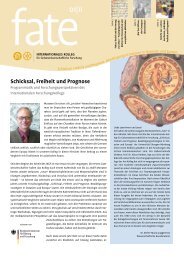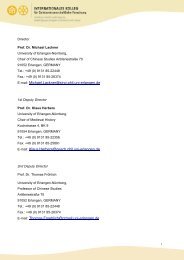Fate, Freedom, and Prognostication - International Consortium for ...
Fate, Freedom, and Prognostication - International Consortium for ...
Fate, Freedom, and Prognostication - International Consortium for ...
Create successful ePaper yourself
Turn your PDF publications into a flip-book with our unique Google optimized e-Paper software.
<strong>Fate</strong>, <strong>Freedom</strong> <strong>and</strong> <strong>Prognostication</strong>.<br />
Strategies <strong>for</strong> Coping with the Future in East Asia <strong>and</strong> Europe<br />
place in the IKGF in 2010. The many individual contributions from<br />
our visiting fellows will be acknowledged in individual articles.<br />
The Workshop “Triangle Eurasia - Managing <strong>Fate</strong> within the Framework<br />
of Direct <strong>and</strong> Indirect Cultural Exchange Processes during the<br />
(European) Medieval Era <strong>and</strong> Early Modern Times”, which was organised<br />
in conjunction with Prof. Dr. Felicitas Schmieder (Hagen),<br />
gauged the parameters of previous instances of contact between<br />
Chinese studies <strong>and</strong> medieval history <strong>and</strong> served as the theoretical<br />
foundation <strong>for</strong> the comparative work of the consortium (see the<br />
corresponding report on p. 16).<br />
In June a workshop of a more conceptual orientation was organised<br />
by Prof. Loris Sturlese (Lecce), a <strong>for</strong>mer visiting fellow at the<br />
consortium, entitled “Mantic, <strong>Fate</strong> <strong>and</strong> <strong>Freedom</strong> in the Middle<br />
Ages”. The event clearly showed the relevance of this topic <strong>for</strong> a<br />
more complete underst<strong>and</strong>ing of medieval history in Europe <strong>and</strong><br />
singled out a number of uncharted research areas on questions relating<br />
to mantic practices (in particular astrology), above all their<br />
philosophical-theoretical evaluation. The results will be published<br />
in a supplement to the Archiv für Kulturgeschichte, thus documenting<br />
the major results of this workshop. Fresh questions are also<br />
tied to the arrival of fresh faces: in 2012 it is envisaged that Prof. Dr.<br />
Alex<strong>and</strong>er Fidora from Barcelona – one of the keynote speakers at<br />
the just-mentioned workshop – will work at the IKGF as a visiting<br />
fellow <strong>and</strong> will examine issues relating to Arabic-Latin cultural exchange<br />
in the late Middle Ages.<br />
Given the major significance of astrology in the mantic practices<br />
of the Middle Ages, this topic will be researched in more depth in<br />
the coming year at the IKGF. A conference entitled “Astrologers <strong>and</strong><br />
their Clients in the Middle Ages <strong>and</strong> Early Modern Times in Europe”<br />
will be organised by Dr. David Juste (Sydney; Visiting Fellow at the<br />
IKGF) <strong>and</strong> Dr. Wiebke Deimann (Erlangen) in September 2011.<br />
A conference report reviewing our first Annual Conference “<strong>Fate</strong>,<br />
<strong>Freedom</strong> <strong>and</strong> <strong>Prognostication</strong>” held in July 2010 is available on p.<br />
12. The second Annual Conference “Key Concepts of <strong>Fate</strong> <strong>and</strong> Prediction<br />
<strong>and</strong> Organization of Knowledge – East Asia <strong>and</strong> Europe in<br />
a Comparative Perspective” planned <strong>for</strong> the 28th–30th of June 2011<br />
will examine, on a comparative basis, conceptual issues exclusively.<br />
On the subject of previews (even if no exact prognosis will be possible):<br />
apart from the regularly held interdisciplinary <strong>and</strong> subjectrelated<br />
colloquia further workshops <strong>and</strong> conferences will take place<br />
in the academic year 2010/2011. Prof. Martin Kern who, coming<br />
from Princeton University, stays with us <strong>for</strong> a year, is organising<br />
an international conference on the topic “<strong>Fate</strong>, <strong>Freedom</strong>, <strong>and</strong> Creation<br />
in Early China” in May 2011. Finally, further into the future, a<br />
conference is envisaged <strong>for</strong> November 2011 which will examine the<br />
2<br />
significance of pilgrimages in Western <strong>and</strong> Eastern religions (title:<br />
“On the Way in the Name of Religion: Contingency Management<br />
<strong>and</strong> Securing the Future in World Religions”).<br />
The work of the research consortium does not exclusively consist<br />
of conferences. The series of lectures held last semester has established<br />
itself successfully at the consortium <strong>and</strong> will be continued<br />
next year. As in the past semesters, the entire university is welcome<br />
to attend the lectures given by the IKGF’s visiting fellows as well<br />
as lectures given by selected invited guests. Abstracts of lectures<br />
from the past summer semester can be found in this newsletter.<br />
The research topics of the IKGF are included in university teaching<br />
via a number of special educational events: in a seminar on “Miracle<br />
<strong>and</strong> Magic” (Hauptseminar, Prof. Herbers <strong>and</strong> Dr. Deimann),<br />
in a tutorial “Mantic Sources” (Dr. Deimann) as well as in a seminar<br />
on “Fengshui & Co: An introduction to the mantic techniques in<br />
China” (Hauptseminar, Dr. Guggenmos).<br />
Finally, the involvement of the consortium with the university departments<br />
is reflected in the increasing number of research partners<br />
of the consortium, who greatly enrich our research through<br />
their expertise. At this moment, the work of the research group<br />
on sacrality <strong>and</strong> sacralization in pre-modern times “Intercultural<br />
perspectives in Europe <strong>and</strong> Asia” is particularly noteworthy. The<br />
project was finally approved by the German Research Foundation<br />
in October 2010 <strong>and</strong> will, through its research str<strong>and</strong>s, the subjects<br />
involved (medieval history, medieval Latin, Old High German,<br />
Christian archaeology/history of art, Indology, Chinese studies,<br />
<strong>and</strong> comparative religious studies), <strong>and</strong> through particular individuals,<br />
be closely related to the work of our consortium.<br />
Although apocalypticism constitutes an additional thematic emphasis<br />
<strong>for</strong> our medievalist section, which in 2009/2010 was represented<br />
above all by PD Dr. Hannes Möhring’s studies on the expectations<br />
of the end of time, <strong>and</strong> which will be further advanced in<br />
2011 by Prof. Richard L<strong>and</strong>es, no apocalyptic scenarios can be conjured<br />
up <strong>for</strong> the consortium. After about one year, the overall positive<br />
review with many beneficial events goes well with the optimistic<br />
preview of fresh questions <strong>and</strong> activities of the year ahead. Suggestions<br />
on the part of our readers are greatly welcomed. And in<br />
general: perhaps we have a preference <strong>for</strong> jovial readers!<br />
Prof. Dr. Klaus Herbers<br />
Deputy Director



